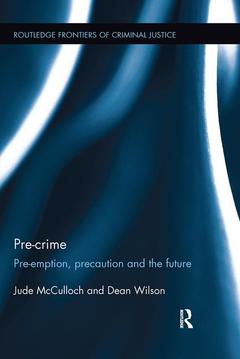Pre-crime Pre-emption, precaution and the future Routledge Frontiers of Criminal Justice Series
Auteurs : McCulloch Jude, Wilson Dean

Pre-crime aims to pre-empt ?would-be-criminals? and predict future crime. Although the term is borrowed from science ?ction, the drive to predict and pre-empt crime is a present-day reality. This book critically explores this major twenty-first century development in crime and justice.
This first in-depth study of pre-crime defines and describes different types of pre-crime and compares it to traditional post-crime and crime risk approaches. It analyses the rationales that underpin pre-crime as a response to threats, particularly terrorism, and shows how it is spreading to other areas. It also underlines the historical continuities that prefigure the emergence of pre-crime, as well as exploring the new technologies and forms of surveillance that claim the ability to predict crime and identify future criminals. Through the use of examples and case studies it provides insights into how pre-crime generates the crimes it purports to counter, providing compelling evidence of the problems that arise when we act as if we know the future and aim to control it through punishing, disrupting or incapacitating those we predict might commit future crimes.
Drawing on literature from criminology, law, international relations, security and globalization studies, this book sets out a coherent framework for the continued study of pre-crime and addresses key issues such as terminology, its links to past practises, its likely future trajectories and its impact on security, crime and justice. It is essential reading for academics and students in security studies, criminology, counter-terrorism, surveillance, policing and law, as well as practitioners and professionals in these fields.
1. Introduction: pre-crime: pre-emption, precaution and the future 2. Before pre-crime 3. Risking the future: pre-emption, precaution and uncertainty 4. Pre-empting justice: pre-crime, precaution and counterterrorism 5. Pre-crime science, technology and surveillance 6. Evidence to intelligence: justice through the crystal ball 7. Creating terror: pre-crime, undercover agents and informants 8. Pre-crime: securing a just future.
Jude McCulloch is Professor of Criminology at Monash University. Her research focuses on the growing integration of crime and war and the impacts of this on justice, politics and society. Jude is on the editorial and advisory boards of leading national and international criminology and interdisciplinary journals. Her research spans counter terrorism laws and policing, police use of force and (in)security politics. She has published widely in scholarly journals as well as in the media and magazines. Jude's books include Blue Army: Paramilitary Policing in Australia, State Crime and Resistance (eds. Elizabeth Stanley and Jude McCulloch) and Borders and Crime (eds. Jude McCulloch and Sharon Pickering).
Dean Wilson is Professor of Criminology, School of Law, Politics and Sociology, University of Sussex, UK. He has published widely in the areas of surveillance, border control, technology and security and the history of policing and criminal justice. He is a Director of the international Surveillance Studies Network and an Associate Editor of the journal Surveillance & Society.
Date de parution : 04-2017
15.6x23.4 cm
Date de parution : 08-2015
15.6x23.4 cm
Thèmes de Pre-crime :
Mots-clés :
Young Man; Counter Terrorism; Pre-crime Laws; Critical Criminology; National Security Strategy; Minority Report; Pre-crime Frames; National Security; Hamid Hayat; Philip K Dick; Pre-crime Offenses; Security-industrial-complex; Security Intelligence Agencies; Social Justice; AFP Officer; Surveillance; Preparatory Offenses; War on Terror; Australian Security Intelligence Organisation; Presumptive Enemies; Traditional Criminal Law; Hayat Case; Asio Officer; Pre-emptive Detention; Predictive Policing; Pre-crime Measures; Asio’s Activity; FBI Informant; Precautionary Logic; Predictive Analytics; Crime Free Future; Mass Casualty Attacks; Pre-emptive Policing; Undercover Agents



